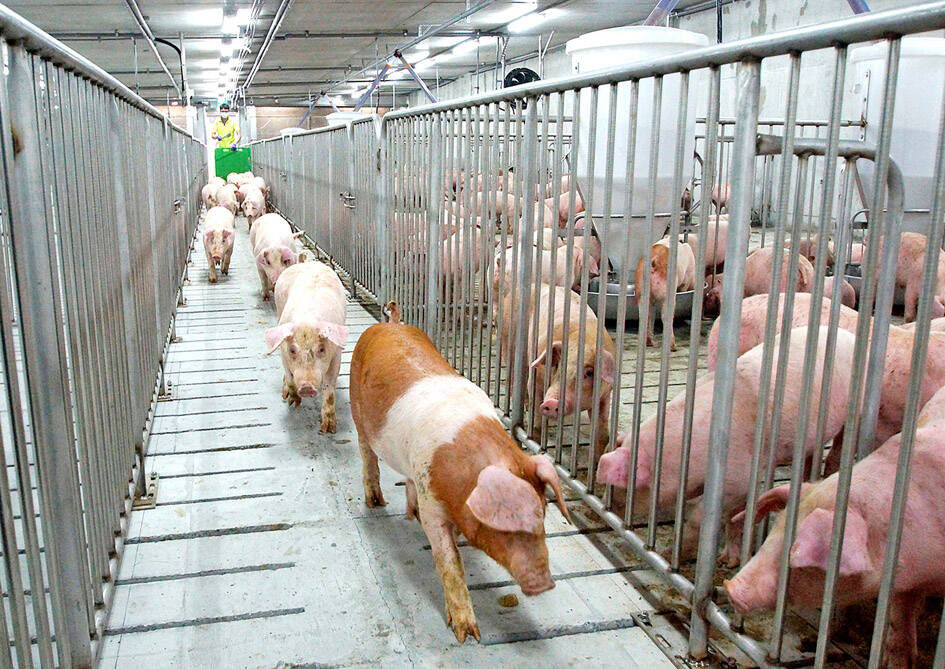Taiwan this week is expected to become the first Asian country to be declared free of the “three swine diseases” — referring to classical swine fever (CSF), African swine fever and foot-and-mouth disease, the Ministry of Agriculture said yesterday.
The World Organisation for Animal Health (WOAH) is expected to declare Taiwan free of CSF this week, the ministry said, adding that the announcement would make Taiwan the only Asian nation to eliminate all of the “three swine diseases” in its territory.
Deputy Minister of Agriculture Tu Wen-jane (杜文珍) is visiting the organization’s annual meeting in Paris to receive Taiwan’s CSF-free certification, the ministry said.

Photo courtesy of Taiwan Sugar Co
WOAH’s 92nd General Session of the World Assembly of Delegates began on Sunday and concludes today at the Maison de La Chimie in Paris.
Taiwan had its first and only documented CSF case in Changhua County in 2015, the ministry said.
CSF is a contagious and highly lethal viral disease that causes hemorrhaging and stillbirths in pigs, it said.
Under WHOA rules, all confirmed cases must be reported to the organization for monitoring and control, the ministry said.
Taiwan vaccinated all of the pigs in its pork industry and implemented an inspection system from 2021 to the middle of 2023, followed by a wind-down period that ended last year, it said.
Officials inspected pig farms for signs of the disease throughout the process before applying to the WOAH for CSF-free status, the ministry said.
Obtaining the status would be a boon to the pork industry, as it would reduce vaccination-related costs, including personnel, buying doses, and losses of pigs to side effects and distress, it said.
The status would pave the way for expanded pork exports and bolster the global market’s confidence in the safety of Taiwanese farm products, it added.
The ministry in 2020 implemented a hazard analysis and critical control points-based certification program for pig farms and slaughterhouses to boost the industry’s global competitiveness, it said.
Agricultural officials continue to negotiate with foreign governments to open up markets while overseeing upgrades to the pig farming and pork-processing industries, it said.
The programs are responsible for decisions by the Philippines and Singapore to partially open to Taiwanese pork in 2023 and last year respectively, it said.
Taiwan had a foot-and-mouth disease outbreak in 1997 and was declared free of the disease in 2020, ending the vaccination mandate for swine raised in the nation, the ministry said.
Taiwan was one of the Asian nations affected by the 2018 African swine fever outbreak before last year regaining WOAH certification of being free from the disease, it said.

Taiwan is projected to lose a working-age population of about 6.67 million people in two waves of retirement in the coming years, as the nation confronts accelerating demographic decline and a shortage of younger workers to take their place, the Ministry of the Interior said. Taiwan experienced its largest baby boom between 1958 and 1966, when the population grew by 3.78 million, followed by a second surge of 2.89 million between 1976 and 1982, ministry data showed. In 2023, the first of those baby boom generations — those born in the late 1950s and early 1960s — began to enter retirement, triggering

ECONOMIC BOOST: Should the more than 23 million people eligible for the NT$10,000 handouts spend them the same way as in 2023, GDP could rise 0.5 percent, an official said Universal cash handouts of NT$10,000 (US$330) are to be disbursed late next month at the earliest — including to permanent residents and foreign residents married to Taiwanese — pending legislative approval, the Ministry of Finance said yesterday. The Executive Yuan yesterday approved the Special Act for Strengthening Economic, Social and National Security Resilience in Response to International Circumstances (因應國際情勢強化經濟社會及民生國安韌性特別條例). The NT$550 billion special budget includes NT$236 billion for the cash handouts, plus an additional NT$20 billion set aside as reserve funds, expected to be used to support industries. Handouts might begin one month after the bill is promulgated and would be completed within

NO CHANGE: The TRA makes clear that the US does not consider the status of Taiwan to have been determined by WWII-era documents, a former AIT deputy director said The American Institute in Taiwan’s (AIT) comments that World War-II era documents do not determine Taiwan’s political status accurately conveyed the US’ stance, the US Department of State said. An AIT spokesperson on Saturday said that a Chinese official mischaracterized World War II-era documents as stating that Taiwan was ceded to the China. The remarks from the US’ de facto embassy in Taiwan drew criticism from the Ma Ying-jeou Foundation, whose director said the comments put Taiwan in danger. The Chinese-language United Daily News yesterday reported that a US State Department spokesperson confirmed the AIT’s position. They added that the US would continue to

One of two tropical depressions that formed off Taiwan yesterday morning could turn into a moderate typhoon by the weekend, the Central Weather Administration (CWA) said yesterday. Tropical Depression No. 21 formed at 8am about 1,850km off the southeast coast, CWA forecaster Lee Meng-hsuan (李孟軒) said. The weather system is expected to move northwest as it builds momentum, possibly intensifying this weekend into a typhoon, which would be called Mitag, Lee said. The radius of the storm is expected to reach almost 200km, she said. It is forecast to approach the southeast of Taiwan on Monday next week and pass through the Bashi Channel